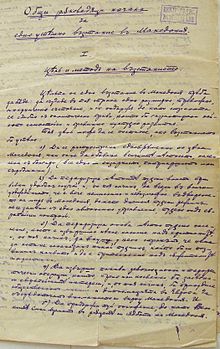Christo Matow
Christo Matow (also written Hristo Matov , Bulgarian Христо Апостолов Матов ; born March 10, 1872 in Struga , today in North Macedonia ; † February 10, 1922 in Sofia , Bulgaria ) was a Bulgarian-Macedonian revolutionary, folklorist, philologist, publicist, functionary Ideologist of the BMARK ( Bulgarian Macedonia-Adrianople Revolutionary Committee , later renamed Inner Macedonian Revolutionary Organization ).
Life
Christo Matow was born on March 10, 1872 in the Macedonian city of Struga in the family of Apostol and Petra Matowi. He had ten siblings, of whom only five - Dimitar, Milan, Maria, Agnia and Tsarewa, like him, came of age . The time was marked by the struggle of the Bulgarian population of the Ottoman Empire for religious and political independence, which was particularly bloody in Macedonia (see Bulgarian Revival ). His education began in the Bulgarian school in his hometown. He continued it in the Bulgarian School for Men in Thessaloniki . Matow was one of the first years of the men's school and after graduating became director of the Bulgarian educational school in Serres for a short time .
In 1894 he turned down an offer from Dame Gruew and Iwan Chadschinikolow to join the BMARK. After the Chetnik action of the Macedonia-Adrianople Supreme Committee, he reconsidered his decision and joined the organization on August 25, 1895. He represented Gjortsche Petrov for a short time as a member of the Central Committee of the BMARK. During this time he became a teacher in the Bulgarian high school in Skopje . There he was able to win Todor Aleksandrov , the last chairman of the organization, for the organization in 1896 , before it was dissolved after the Second World War. In 1897, Christo Matov issued the book The Serbian Claims in Western Bulgaria due to his public office under the pseudomyn. In the book he goes into the Serbian propaganda and defends the position of the Bulgarian people in Macedonia. As early as 1895 Matow became a school inspector and in 1896 director of the grammar school in Skopje, as well as chairman of the Skopje Revolutionary Committee and member of the Central Committee of the BMARK. It held all posts until 1901, when he was arrested by the Ottoman authorities for revolutionary activities after the so-called Thessaloniki affair and banished to the fortress of Bodrum in the Aegean Sea . In 1902 he came through an agreement between the Principality of Bulgaria and the Ottoman Empire, on condition that he immigrated to liberated Bulgaria. He then settled in the Bulgarian capital Sofia, like many other Macedonian Bulgarians , and became a member of the diplomatic mission of the BMARK.
After his exile, Matow became one of the main ideologues of the BMARK. Alongside Goze Deltschew, he was involved in the preparations for the Ilinden-Preobraschenie uprising of 1903 and in May 1903 he prepared the general plan for carrying out the uprising in Macedonia . In 1906 he was confirmed in his function as a member of the BMARK diplomatic mission abroad.
In the Balkan War that broke out in 1912 , he took part as part of the Macedonia-Adrianople Volunteer Corps , for which he was honored with the Military Order of Merit and the Order of St. Alexander . During the First World War he initially served in the General Staff of the Bulgarian Army and after the conquest of Skopje he published the newspaper Rodina there . In 1917 Christo Matow published a twelve-point program in which he sharply criticized the positions of Bulgarian politics and diplomacy after World War II with regard to the Macedonian question and the Bulgarian unification question .
Cristo Matov died on February 10, 1922 in the Bulgarian capital Sofia.
Trivia
Christo and his brother Milan were good friends with the poet-revolutionary Pejo Jaworow . Before one of his suicide attempts, Jaworow looked in her apartment for a weapon after the brothers refused to give him one. Matov Peak , a mountain in Antarctica, has been named after him since 2015 .
bibliography
- Сръбските пратеници на Македония (1897), under the pseudonym D. Insarow
- Основи на вътрешната революционна организация, Volumes I, II and III
- За управлението на вътрешната революционна организация, Volumes I and II
- Въстанишки действия, Volumes I and II
- Репресалии против гръцката въоръжена пропаганда
- Пропуснати случаи
- Писма за Македония отговор на г-н Янко Сакъзов (1910)
- Впечатленията от Македония на д-р Кръстю Раковски (1911)
- Христо Матов за своята революционна дейност
swell
- Boris Nikolow: Вътрешна македоно-одринска революционна организация. Войводи и ръководители (1893-1934). Биографично-библиографски справочник. Sofia, 2001, p. 164.
- Bulgarian State Archives (from the Bul. Главно управление на архивите): Македоно-одринското опълчение 1912-1913 г. Личен състав. Sofia, 2006, p. 108.
Individual evidence
- ↑ Die Brüder Matow (Bulgarian) ( page no longer available , search in web archives ) Info: The link was automatically marked as defective. Please check the link according to the instructions and then remove this notice. in the online edition of Sega magazine November 8, 2005.
- ↑ Todor Petrow / Zocho Biljarski: ВМОРО през погледите на нейните основатели , Militärverlag, Sofia 2002, p. 108, p. 112 and p. 114.
| personal data | |
|---|---|
| SURNAME | Matow, Christ |
| ALTERNATIVE NAMES | Matov, Hristo; Матов, Христо Апостолов (Bulgarian spelling) |
| BRIEF DESCRIPTION | Bulgarian revolutionary |
| DATE OF BIRTH | March 10, 1872 |
| PLACE OF BIRTH | Struga , North Macedonia |
| DATE OF DEATH | February 10, 1922 |
| Place of death | Sofia , Bulgaria |

